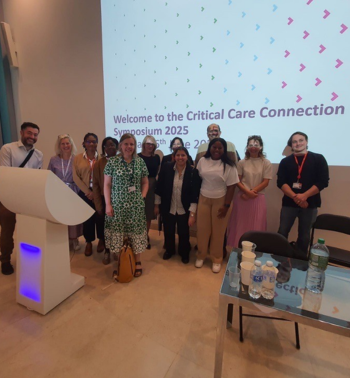14 October 2025
On 16 June 2025, King’s Health Partners (KHP) Neurosciences hosted the first-ever Critical Care Connection Symposium, bringing together specialists from critical care, psychiatry, neurology, and psychology to explore how these specialties intertwine in the intensive care setting.
Held at the Fetal Medicine Institute, Denmark Hill, the symposium drew more than 120 clinicians, academic clinicians, and academics eager to rethink intensive care as a holistic practice that addresses both mind and body.
A Learning Milestone for Integrated Critical Care
The Critical Care Connection Symposium, was opened by Dr. Tom Best, Clinical Director for Critical Care, King’s College Hospital NHS Foundation Trust. With 30 expert speakers and sessions ranging from autoimmune encephalitis and traumatic brain injury (TBI) to psychophysiology and post-Intensive Care Unit (ICU) recovery, the symposium underlined the need for collaboration in research to address the psychiatric and psychosocial dimensions of critical illness.
Feedback from one attendee captured the value of the day’s discussions and the need for further dialogue:
There are not many opportunities to learn about the intersection of ICU and psychiatry. Hence this was priceless.”
Innovative Thinking: The Mind-Body Connection in the ICU
One of the core sessions highlighted the psychiatric complexity of ICU patients, noting that long stays, pre-existing conditions, and acute stress reactions all influence recovery trajectories. From hallucinations to post-traumatic symptoms, ICU experiences often leave deep psychological imprints, demanding robust mental health integration from admission to discharge and beyond.
Sessions on autoimmune encephalitis emphasised early clinical recognition over delayed lab confirmation, while other presentations advocated for nuanced uses of the Mental Health Act to balance care and patient rights.
The impact of TBI was explored in the hyperacute phase, as well as the context of a social determinant, with implications for homelessness, substance use, and long-term cognitive disability. Insights into catatonia, interoception, and functional disorders showcased the diversity of psychiatric presentations in critical care, calling for new diagnostic frameworks and education across disciplines. Talks on the psychophysiology of breathing and weaning, highlighted that disruptions in breathing patterns can both signal and contribute to psychological distress, and weaning from mechanical ventilation is more than just a physiological process.
Learning in Focus:
Key learning points from the day included:
- Psychiatry in ICU: Recognising agitation, withdrawal, and psychiatric comorbidities as critical aspects of patient management, requiring systematic tools and phenotyping.
- Delirium Detection: Empowering nursing staff, addressing hypoactive states, and creating therapeutic environments like roof gardens.
- Post-ICU Trajectory: Understanding that psychiatric symptoms often resolve last. Life disruption for patients and families, psychosocial impact and journey a patient has, including stigma from psychiatric misdiagnosis or sectioning.
- MDT Involvement: The importance of multi-disciplinary team (MDT) involvement (including psychology, psychiatry, neurology, physiotherapy, occupational therapy, and social work) in critical care patients.
- Data-Driven Insight: Using structured data collection to tailor interventions and track long-term outcomes. Understanding global healthcare systems in neurosciences.
- Systems Integration: Bridging gaps between services to prevent patients from falling through the cracks, particularly during transitions out of acute care.
Connecting Minds and Creating Opportunities for Innovation
The symposium served as a catalyst for connection across specialties and highlighted creative innovation, including tools like Cognitron, a flexible, scalable platform for remotely assessing cognition and mental health. These efforts align to the ambitions of the King’s Health Partners 2030 Strategy, which champions:
- connecting our partners;
- building capacity in people through education, knowledge sharing, and training; and
- creating opportunities for collaborations that improve health research, education, and care.
Learn more about the KHP 2030 vision: King’s Health Partners 2030 Strategy
What’s Next: Building a Collaborative Future
Prof Matthew Hotopf CBE, Executive Dean of the Institute of Psychiatry, Psychology & Neuroscience, closed the symposium with a powerful call to action: to continue collaboration that transcends traditional clinical silos. Following this, the planning committee has met to discuss next steps, including selecting key project focus areas for collaboration: delirium, electroencephalogram (EEG), encephalitis, brain injury, functional respiratory, and the burden of critical illness on mental health and long-term outcomes. The group also plans to present talks at existing cross-discipline forums and has begun initial discussions on hosting an annual symposium.
If you would be interested to contribute to further discussions in this space, please don’t hesitate to get in touch with the KHP Neurosciences Team via KHPNeuroscience





